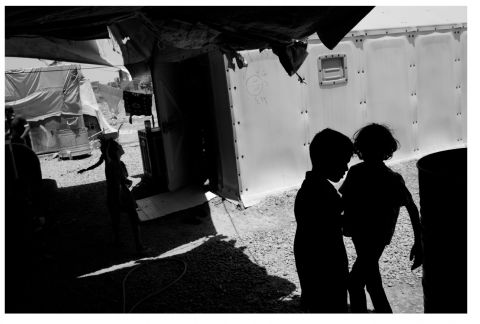Pulitzer Center Update August 22, 2016
Readers in U.S. and Middle East Respond to 'Fractured Lands'

On Sunday, August 14, 2016, The New York Times Magazine devoted an entire issue to a single story by Pulitzer Center grantees Scott Anderson, Paolo Pellegrin, and Ben Solomon. Their story, "Fractured Lands," examines the Iraq War, Arab Spring, rise of ISIS, and current refugee crisis from the perspectives of six Middle Easterners. Now, after more than a week of circulation online and in print, readers in both the U.S. and Middle East are responding.
In his Preface, Anderson focused on three historical developments that led to the Arab world's current upheaval: "The inherent instability of the Middle East's false nations"–countries that European powers created out of the defunct Ottoman Empire after World War I, with little regard for history or ethnic loyalties–"the precarious position in which U.S.-allied Arab governments have found themselves when compelled to pursue policies bitterly opposed by their own people; and American acquiescence to the de facto partitioning of Iraq 25 years ago...that helped call into question the very legitimacy of the modern Arab nation-state." Anderson, Pellegrin, and Solomon report on how, over the past decade, their six subjects have responded to this combination of Western meddling and shifting national politics.
Not all readers found this description sufficient. Writing in World Politics Review, Ellen Laipson, former president of the Stimson Center, argued that, "Anderson gives too much attention to the artificial borders as proof of the inevitable failure of the modernist republics," noting that "false nations" such as Iraq and Syria had achieved tangible economic and social gains in the late 20th Century. She also questioned the direct link that Anderson posits between the 2003 American invasion of Iraq and the Arab Spring. Despite these points of contention, Laipson concluded that "the article's insights into the anti-Americanism that is now so deeply engrained are stunning and significant for the next U.S. administration."
Other readers faulted Anderson for writing too little about Islamic extremism. Ira Sharkansky, professor emeritus of political science at Hebrew University, wrote that the piece's greatest flaw was a "naivete about cultures." Writing on The Jerusalem Post's website, Sharkansky argued that, "Islam is right in the middle of it, but it's too simple to say that the violence is entirely due to the doctrines and practices of Muslims. Islam developed, and remains concentrated in a region only lightly touched by the sentiments idealized in the democratic west." David French wrote in the National Review that "the magazine largely underplays the historic and present influence of Islam—in particular of Islam's most vicious jihadist strains."
Yet when three Middle Eastern writers responded to "Fractured Lands" in The New York Times Opinion Section on Friday, August 19, none of them labeled Islam as the primary cause of their region's problems. One of the authors, Egyptian novelist Yasmine El Rashidi, wrote: "The current state of both Egypt and the region can't be reduced to one or two significant causal events." In addition to the century of Western interventions that Anderson discussed, El Rashidi attributed her country's current problems to its long-running economic troubles. While Anderson's overall assessment of the region's short-term future was grim, El Rashidi pointed out that "History is cyclical, and revolutions, even messy ones, take decades."
In the same Op-Ed, Haaretz columnist Sayed Kashua also held out hope for the Middle East's long-term future. He acknowledged that many revolutionaries' hopes have been dashed in recent years. "But the same cry of 'freedom' continues to resound in their hearts," he wrote, "...in the hope that the next generation will learn from the mistakes of its predecessors, and know how to better estimate the cruelty of its enemies."
If that "next generation" will succeed, predicted Brandeis University Professor Kanan Makiya, it will need to better understand its own history. "Scott Anderson's account of the Arab unraveling raises a question that he does not address," he wrote. "Could anyone in the business of carving up the post-Ottoman Middle East have understood the complicated tribal, religious and sectarian networks at play centuries before modern European nation states even existed? And if by some miracle all that complexity was knowable, would it have made a difference to the stories of the men and women Mr. Anderson writes about?" Only when Arabs hold a better grasp of the origins of their current dilemma, he concluded, can the region hope to move forward.
Back in the U.S., meanwhile, many readers voiced hope that the piece would deepen Americans' understanding of the Middle East. As Huffington Post contributor Carol Smaldino saw it, "The fact that the editors of the New York Times decided to go ahead with this project tells me that they sense that many Americans are somehow hungry to know more, to connect more with what happened so we know better how to proceed."







